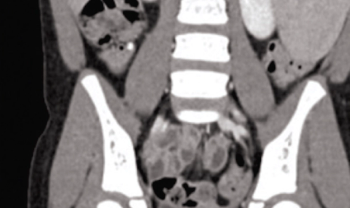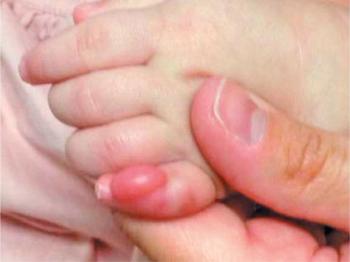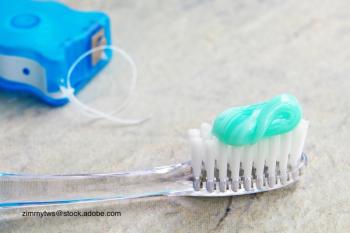
Kids who experience a bone fracture in childhood are more likely to suffer another.

Meant to help infants breastfeed more easily, the frenotomy procedure appears to be performed on some infants who don’t require it, according to a new study found in JAMA Otolaryngology-Head and Neck Surgery.

Dr. Andrew J. Schuman looks at the artificial intelligence (AI) programs that may be found in your practice sooner rather than later.

Updated practice guidelines published by the American Academy of Pediatrics (AAP) aim at managing infants at risk for Group B streptococcal disease.

With parental substance use on the rise, in large part attributed to the opioid crisis, foster care is seeing an increased number of children being placed into its system, according to a research letter published in JAMA Pediatrics.

Contemporary Pediatrics sits down exclusively with Sheila Fallon Friedlander, MD, a professor dermatology and pediatrics, to discuss the one key condition for which she believes community pediatricians should be especially aware-hemangiomas.

It may seem like something that only adult women will experience, but reproductive coercion can be a problem for older teenaged girls as well, according to a new study published in Obstetrics & Gynecology.

Janssen, a pharmaceutical subsidiary of Johnson & Johnson, has announced plans to pursue a pediatric indication for its best-selling blood thinner, Xarelto (rivaroxaban).

A new study from Children’s National in Washington, DC, confirms that universal background checks and strict state laws are key to reducing the deaths of children and teenagers by firearms.

Alone, on its back, in a crib. That’s the only safe place for an infant to sleep. New data say why car safety seats are not included.

A 6-year-old female with history of previously resolved iron-deficiency anemia presents to the emergency department (ED) for numerous episodes of nonbloody, nonbilious vomiting and diffuse abdominal pain that began on the day of presentation. She had initially presented to her pediatrician who felt a large left-upper-quadrant abdominal mass and referred her to the ED for further evaluation. She has no associated diarrhea or urinary symptoms. What's the diagnosis?

Measles cases continue to add up in the worst outbreak of the viral infection in the United States since 1992.

A new study highlights the fact that black, Hispanic, and other ethnic minority children who suffer from out-of-hospital cardiac arrest are less likely than their white counterparts to receive cardiopulmonary resuscitation (CPR) from a bystander.

The American Medical Association (AMA) calls out government agencies for deplorable conditions for children and pregnant women in immigrant border facilities.

Already an effective treatment for Clostridium difficile infection, fecal transplantation may offer children with autism new hope.

Adopting technologies with artificial intelligence (AI) will change patient care in many ways. Here’s where AI has been, where it is now, and what it holds for the future of pediatrics.


The Centers for Disease Control and Prevention (CDC) cautions pediatricians and other pediatric healthcare providers to be on the lookout this summer and early fall for symptoms of acute flaccid myelitis (AFM) in young patients who complain of limb and muscle weakness.

A new study from researchers at Columbia University indicate that the solution to increasing influenza immuinzation rates may be simple.

Accept this month’s 5-item quiz challenge and see how well you know the wiles of biofilms in Staphylococcus aureus that deploys a matrix “force field” to evade detection and eradication. What children are especially at risk? What treatment course gives the best outcomes?

Measles is once again a significant public health problem in the United States. Many pediatricians and most parents have never seen actual measles in a child, hence the urgent need to reeducate clinicians and caregivers about clinical manifestations and prevention of the disease.

An otherwise healthy 5-month-old girl presents with an asymptomatic, rapidly growing, firm, smooth nodule on the side of her left fifth finger since she was 2 months of age.

Parents who use a web-based educational tool to boost what they know about measuring and managing fever gain significantly more knowledge than parents who follow solely written and verbal instruction, according to a trial in caregivers of children with fever.

A recent study has found that direct-to-consumer (DTC) telemedicine services were more likely to prescribe antibiotics than urgent care centers and pediatric practices, and less likely to follow guidelines on antibiotic use.

Specific therapies for biofilm-related infections are rare. However, studies have shown rifampin to be an effective treatment for these staphylococcal infections in children.

A physician incentive program (PIP) that provides primary care providers (PCPs) with bonuses tied to specific goals to decrease pediatric emergency department (ED) use significantly decreases such visits, according to a retrospective analysis involving 1376 PCPs who participated in the PIP.

The case for medical marijuana in children is just getting started. Here’s how pediatricians can navigate the complexities and discomfort of this issue and address the risks and benefits of pharmaceutical cannabinoids for their patients.

An evaluation of national and state-level trends in obesity prevalence among 2- to 4-year-old participants in the US Special Supplemental Nutrition Program for Women, Infants, and Children (WIC) found that the changes in the 2009 WIC food packages to better align with dietary guidelines are associated with a decline in the risk of obesity among these children.

The later teenaged years are a time of missed opportunities for preventive care and vaccination, according to a new report focused on low rates of meningococcal booster vaccination.

You're a busy person with many things to do and little time to read. Here are 5 articles that give you a quick rundown of important matters for the pediatric provider.